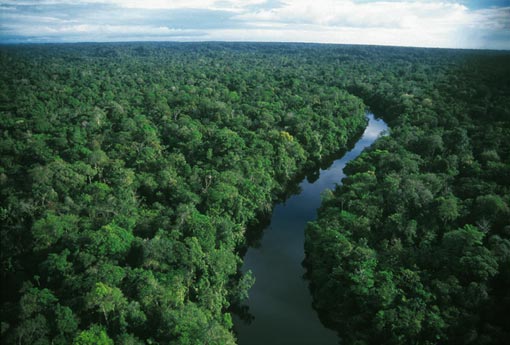The false solutions to the climate change crisis case hearing at the 5th International Rights of Nature Tribunal took place on Wednesday, November 3, 2021, in Glasgow, alongside the United Nations Conference on Climate Change (COP26). Due to COVID and traveling restrictions, the Tribunal was a hybrid event – online through zoom and in person at the Auditorium of Strathclyde University.

The Fifth International Rights of Nature Tribunal heard on Nov. 3 one of two fundamental ecological cases facing the world today: the false solutions to the climate change crisis and the Amazon, a threatened living entity.
The climate change case was presented by frontline, impacted communities and experts from around the world, and was heard by a panel of globally recognised judges, who examined and ruled on the cases from a Rights of Nature perspective: Enrique Viale (Argentina), Alberto Acosta (Ecuador), Osprey Orielle Lake (USA), Nnimmo Bassey (Nigeria), Lisa Mead (UK), Carolyn Raffensperger (USA), and Yaku Pérez (Ecuador).
Just a few years ago, the reality of climate change was subtle enough that many people continued to deny its existence despite all scientific data proving otherwise. Today, as extreme weather events, wildfires, droughts, floods, hurricanes, among others, become more and more commonplace – and more extreme – it has become impossible for all but the most cynical to deny the reality of man-made climate change.
And yet, despite the record-breaking wildfires, despite the increased flooding and the destabilised seasons, governments around the world continue to collude with extractivist industries, finding ways to go on permitting patterns of exploitation, production and consumption that are unsustainable.
However, perhaps the most concerning aspect of how this problem is being dealt with at the international level is that, ever since the general public has begun to grow conscious of the threat posed by climate change and to demand change from the authorities, a series of pernicious false solutions have been conceived; false solutions which pretend to address the key issues while in reality only perpetuating this unsustainable status quo, and even worse, “solutions” that may affect and violate even more of Nature’s Rights.
From the idea that geoengineering will permit us to regulate the global temperature even as we continue consuming fuel and materials at our current rates, to the notion the unexploited fossil fuel reserves in one place can be “traded” for reserves that are being exploited elsewhere, these strategies all have the same purpose: to “greenwash” old practices, while making no substantial changes.
The United Nations Climate Change Conferences – and other similar forums – have become the main arenas for the promotion of these ideas, making it more important than ever to show them for what they are, and to provide both the public and the authorities with a clear, unclouded perspective on why these strategies are not real solutions to the urgent problems that we face – and what some real solutions could be.
The aim of this Tribunal is to bring maximum visibility to the current key struggles to protect the world’s ecosystems and confront the false solutions that are being presented in the face of these crises as well as the solutions emerging from civil society, and to offer legal rulings and precedents that may aid communities and activists in their struggles to protect and restore these ecosystems and advance the legal recognition of Nature as a rights-bearing entity.
The objective is to mobilise citizens through the creation of a platform of associations calling for the recognition of the Rights of Nature, the Rights of the Amazon, and exposing the false solutions to climate change as well as the opportunities to halt the climate crisis.
Ivonne Yáñez, case presenter at the Tribunal, stated that “the aim is to use carbon as a financial commodity, to transform nature into a sewer and keep exploiting it and the women and the people from the Global South. False solutions are business as usual without thinking about the climate or the people.”
Case presenter Tom Goldtooth expressed that “Nature-based solutions often violate the Rights of Nature and are co-opted by corporations. Carbon trading and extractivism are two sides of the same coin. Those in the hallways of COP26 don’t understand the sanctity of Mother Earth.”
Chief Ninawa, from the Amazon, spoke about the impact of false solutions on Indigenous territories and made three concrete demands for social, environmental, and ecological justice to the Tribunal. “Our territory is sacred. Extractivism is a problem we need to solve today,” he added.
Bruno Rodríguez, from Fridays for Future, said: “If we don’t protect Rights of Nature, we’ll be jeopardising the future of the younger generations.”
The prosecutor for the case was Julio Prieto, from Ecuador, and the verdict for the case will be presented at the Glasgow Film Theater on November 7 during the People and Nature vs The UNFCCC event.
